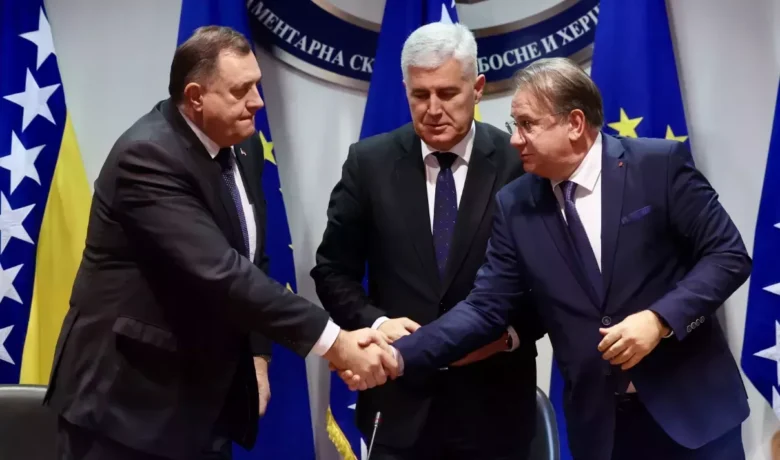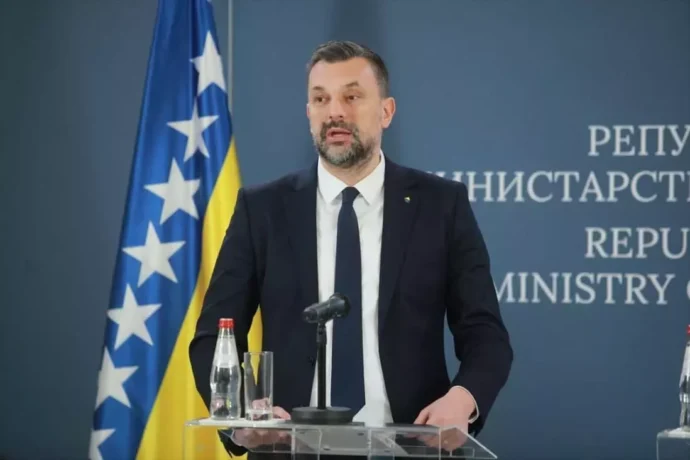
Whoever falters on the sidewalk will betray the state too: SDA, SBiH, and DF leaders must answer—Is the state more important than local interests?!
Written by: Rasim Belko @rasimbelko
Can Sarajevo politics, which labels itself as patriotic or pro-state, finally realize that the long-term benefits of formally proclaimed ideas will be absent not only for such politics and the citizens but especially for the state of Bosnia and Herzegovina?
Before the October Local Elections in Bosnia and Herzegovina, Sarajevo witnessed the announcement of a political agreement called the “Sarajevo Response” to the dire situation caused by the current government led by the Trojka project (SDP, NiP, NS).
This “Sarajevo Response” was crafted by the SDA, Stranka za BiH, and the Democratic Front. It functioned significantly well despite occasional public evidence of personal interests and animosities that shook the foundations of the agreement during the pre-election period.
However, the initial agreement acted as a turbine driving the winds of change. This atmosphere was palpable, offering the public an alternative to the dismal political image of the incumbents—a broader political narrative with the potential to create new local and possibly state-level governance.
This is why it must be clear to the leaders and members of the parties that formed the “Sarajevo Response” before the elections that their good results in the capital were not solely their achievement but were largely due to the improved atmosphere. The public had hoped that this agreement might start building a foundation for broader change.
What we have witnessed in recent days and weeks is a return to some old practices. The root of the problem lies not in what leaders often present as a “local issue,” but in the fact that local levels are more affected by interest-driven structures that are already planning projects for the upcoming term.
We have been observing for too long how, in every local community where two or more interest groups clash, political agreements for the common good seem impossible. This leads us to a critical question that the leaders of the “Sarajevo Response” must ask themselves and answer: Can this society be built on stable foundations and become prosperous if every agreement for the common good is undermined by tender-lovers and tender-enthusiasts?
It seems this is the core issue of politics that calls itself pro-Bosnian. Similar examples have been seen in the past, the most recent being the case of the Novi Grad Municipal Council. This should not overshadow the issues in Hadžići’s Council, where two out of the three “Sarajevo Response” parties also diverged.
It is clear that the leaders, primarily SDA’s Bakir Izetbegović and Semir Efendić of Stranka za BiH, due to the potential the “Sarajevo Response” narrative holds for the state, not only need to seek solutions but must find them.
They must do so if they are serious about their announcements and desires to build a political bloc by the 2026 General Elections that can channel the state onto the right track through unified governance.
For this to happen, petty particular interests must be controlled or minimized, just as potential errors and traitors are minimized during the defense of the state. Party leaders and their advisory teams must finally understand that every significant divergence at the so-called local level adds another wound to the state-building fabric.
And we have seen this happen, from Mostar, Bihać, Srebrenica to Sarajevo.
Otherwise, every individual narrative about patriotic policies and the intentions of these parties will be overshadowed by political immaturity and the inability to understand that the state exists both where sewer systems are addressed and where diplomacy is in action.
The hegemonism of neighboring countries, the complete apathy and corrosion of ideological solutions from the international community, and the artificially created political bloc by international circles, which has proven detrimental to Bosnia and Herzegovina, oblige the leaders of the “Sarajevo Response”—Izetbegović, Efendić, and Željko Komšić—to look beyond local and daily political topics.
The positions in Hadžići’s, Novi Grad’s, or any other municipality’s councils, or the interests of those labeled as local powerbrokers of certain parties, must not overshadow state matters. Or at least they shouldn’t, because if we have doubts about the state at this level, everything spoken about the state is questionable.
For whoever falters on the sidewalk will betray in parliament too.


